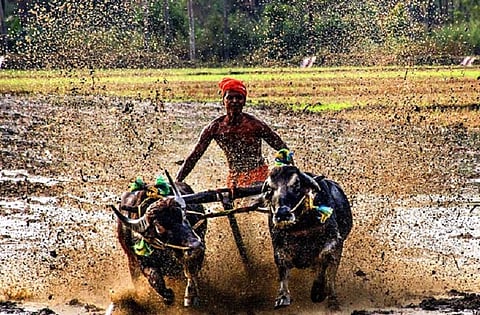

Animal rights organisation People for the Ethical Treatment of Animals (PETA) India filed a fresh investigation report alleging that animals used in the traditional buffalo racing sport Kambala are not ‘anatomically or physiologically suited for racing.’
PETA India submitted its latest report in the Supreme Court after watching four Kambala events in Karnataka, as part of its petition seeking to overturn the Prevention of Cruelty to Animals (Karnataka Second Amendment) Act, 2017. The act allows Kambala races to be held in the state.
PETA observed races held in Baradi Beedu in Udupi and in Moodabidri, Mangaluru, and Thiruvail in Dakshina Kannada. These races were held between December 2018 and February 2019. Officials of PETA India collected photographic and videographic evidence from these races. PETA India has
In its report, PETA India claimed, "Reluctant, scared buffalo bulls were whacked repeatedly with bare hands, slapped in the face, kicked, poked and hit with wooden sticks, dragged to the starting point by groups of five or six people, and shouted at."
The report also added that buffaloes were hit with bare hands and uncoated sticks during the races despite the organisers claiming that wooden sticks covered with foam or fibre will be used. PETA also submitted pictures showing wounds suffered by buffaloes from the beatings and claimed that they were camouflaged by a black substance.

Photograph of a buffallo in a race in Mangaluru
"Cruelty is inherent in Kambala events, as buffalo bulls aren't anatomically or physiologically suited for racing and no amount of regulation can change this scientific fact," PETA India CEO Manilal Valliyate said.
Kambala is a slush-track buffalo race held in Dakshina Kannada and Udupi districts between November and March. The races involve pairs of buffaloes tied to a plough, which run on parallel slush tracks, with a farmer controlling them while balancing on the plough.
For many years, PETA India has opposed Kambala by saying that buffaloes are treated cruelly during races. It was outlawed based on the Supreme Court judgement that made Jallikattu, a bull-taming sport in neighbouring Tamil Nadu, illegal in 2014 but Kambala races continued to occur sparingly since there was no clear law banning Kambala specifically. Organisers of the sport were keen to point out that Kambala involved buffalo racing and that it was different from bull-taming. The sport was eventually banned in November 2016 by the Karnataka High Court after a public interest litigation was filed by PETA India.
This led to protests in Moodabidri in January 2017 when Kambala enthusiasts turned up with their buffaloes to oppose the ban in Moodabidri, a place popular for Kambala races. The protesting buffalo owners were keen to emphasise the hoary tradition and strong love for animals as the reasons for keeping the traditional sport alive.
The ban was lifted in July 2017 after the President gave assent to the Prevention of Cruelty to Animals (Karnataka Amendment) Ordinance of 2017, which excludes Kambala from the list of activities considered as practices involving animal cruelty. Kambala races were held from November 2018 to March 2019 with organisers promising steps to ensure that animals are not mistreated.
In September 2018, PETA India filed a fresh petition in the Supreme Court seeking a ban on Kambala. With the start of the Kambala season approaching, organisers of the sport are waiting to see if the sport will be allowed to go ahead this year.